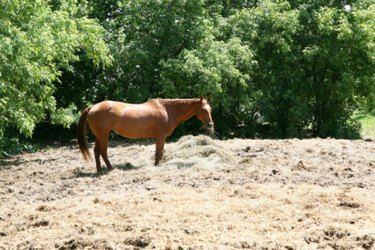
Unfortunately, there are many large shade trees that are harmful to livestock like horses, cattle, sheep, goats and swine. Since shade is important for all animals as protection against summer's heat, removing poisonous varieties of shade trees like red maple, oak, cherry and plum trees from your pastures or paddocks can leave you with a dilemma. Most shade trees take years, and sometimes even decades, to provide adequate protection from summer sun; however, a few varieties grow rapidly.
The Royal Empress
Video of the Day
One of the best trees you can plant for both you and your livestock is a deciduous hardwood called the Royal Empress or Empress tree. It is a hardy plant that can easily shoot up to 20 feet in a single growing season. In the spring it rewards you with fragrant purple blossoms, and the large flat leaves provide plenty of shade. Not only is it non-toxic, but the leaves are used as fodder for livestock in some areas. The tree is easy to grow and thrives across the United States.
Video of the Day
Pines
There are a number of varieties of pine, excluding the ponderosa pine, that are safe to grow in livestock pastures. At maturity, pines can range in height from 40 feet to well over 200 feet and are evergreen. Due to their evergreen tendencies, they also provide shelter from winter winds, especially when planted in rows or groves. They have a rapid growth rate, and are found across the country.
Cottonwoods
Cottonwood trees prefer the southern half of the country, and grow to heights of 80 feet or more. They are often found along riverbanks and on the shores of lakes. They are non-toxic to livestock and are also largely safe from foraging damage as livestock generally find them unpalatable. They grow quickly in wet soil and can be ideal for shade if you have a river or stream running through your pasture.
Sycamores and Sweetgums
The American Sycamore tree is native to the United States and grows well throughout much of the country. It tolerates cold well, and grows to be massive, with trunks known to reach as much as 15 feet in diameter. With its spreading crown, it provides excellent non-toxic shade for livestock. The sweetgum is a rapidly maturing choice for shade if you have a large pasture, as its spreading roots need plenty of room to stretch. The sweetgum is second only to the oak in lumber preference for furniture wood, and it possess medicinal properties in the resin. Both trees grow to a minimum 75-foot height and provide excellent non-toxic shade for your animals.
- Cornell University Department of Animal Science: Plants Poisonous to Livestock; March 2011
- Quick Growing Trees: Empress Tree (Princess Paulowania); 2010
- The University of Texas at Austin: Ask Mr. Smarty Plants; March 2010
- Colorado State University Extension: Cottonwood Tree (populus freemontii); January 2010
- The University of Texas at Austin: Ask Mr. Smarty Plants; May 2010
- Planting Directions: Royal Empress (Paulownia) Tree;
- Florida Gardener: Recommended Shade Trees for Florida; June 2008